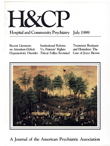Chronic Mental Illness and the Criminal Justice System
Abstract
A total of 260 family members responded to a survey seeking information about their mentally ill relatives' contacts with the criminal justice system. Reports by family members indicated that the mentally ill relatives were mainly men in their early thirties with a diagnosis of schizophrenia or bipolar disorder; they had had an average of four admissions to a state mental hospital . The majority had been arrested , but only a fifth had been convicted of a crime. Substance abuse and noncompliance with psychiatric medications were significant predictors of arrest. Family members overwhelmingly attributed the arrests to psychiatric crises, and in about half the cases a failed attempt at commitment had preceded the arrest. However, only a minority of the mentally ill relatives were taken to a hospital at the time of the arrest. The findings highlight the need for closer collaboration between mental health specialists and law enforcement personnel.
Access content
To read the fulltext, please use one of the options below to sign in or purchase access.- Personal login
- Institutional Login
- Sign in via OpenAthens
- Register for access
-
Please login/register if you wish to pair your device and check access availability.
Not a subscriber?
PsychiatryOnline subscription options offer access to the DSM-5 library, books, journals, CME, and patient resources. This all-in-one virtual library provides psychiatrists and mental health professionals with key resources for diagnosis, treatment, research, and professional development.
Need more help? PsychiatryOnline Customer Service may be reached by emailing [email protected] or by calling 800-368-5777 (in the U.S.) or 703-907-7322 (outside the U.S.).



